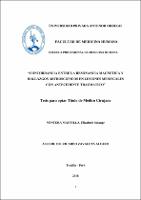Concordancia entre la resonancia magnetica y hallazgos artroscopicos en lesiones meniscales con antecedente traumatico

Ver/
Descargar
(application/pdf: 536.6Kb)
(application/pdf: 536.6Kb)
Fecha
2016Autor(es)
Ventura Mantilla, Elizabeth Solange
Metadatos
Mostrar el registro completo del ítemResumen
Introducción: Las lesiones meniscales constituyen en la actualidad una de las principales
causas de disfunción del aparato locomotor, siendo su diagnóstico un reto para los cirujanos
ortopedistas en su práctica clínica diaria. La resonancia magnética ha sido ampliamente
usada con el fin de diagnosticar y seleccionar a los pacientes tributarios a cirugía. Sin
embargo muchas veces se sobre diagnostica u omite este tipo de lesiones, suponiendo un
gasto innecesario para los pacientes, quienes de igual manera son sometidos a la artroscopia,
que es un método diagnóstico terapéutico.
Objetivo: Determinar la concordancia entre la resonancia magnética y los hallazgos
artroscópicos en lesiones meniscales con antecedente traumático.
Material y métodos: El diseño de investigación es observacional, analítico, retrospectivo,
de concordancia. Este estudio fue realizado en el Hospital Militar Central, con pacientes
atendidos en el servicio de Ortopedia y Traumatologia durante el año 2015. Posteriormente
los datos fueron vaciados al Paquete estadístico SPSS-23 y analizados con el índice Kappa
de concordancia.
Resultados: Hubo un total de 250 pacientes, de los cuales se excluyeron a 23, quedando 227
aptos. La edad promedio fue de 38.8 años con predilección del sexo masculino con un 68.7%
(156 pacientes). La rodilla más afectada fue la derecha (59.9%) con predominio del menisco
medial (62.4%). El índice kappa fue de 0.179.
Conclusión: Hay suficientes evidencias estadísticas para afirmar que si hay concordancia
entre la resonancia magnética y lo hallazgos artroscópicos, sin embargo a pesar que hay
concordancia, esta es insignificante (0.179). Background: Meniscal injuries are now one of the leading causes of locomotor dysfunction,
and its diagnosis is a challenge for orthopedic surgeons in their daily clinical practice . MRI
has been widely used in order to diagnose and tax selecting patients for surgery. However,
it is often over diagnosed or omit this type of injury , assuming unnecessary cost for patients
who likewise undergo arthroscopy, which is a therapeutic and diagnostic method.
Objective: Determine the agreement between MRI and Arthroscopic findings in meniscal
lesions with traumatic history.
Material and methods: The research design is observational, analytical, retrospective and
agreement. This study was conducted at the Hospital Militar Central, with patients treated in
the Orthopedics and Traumatology service in 2015. Subsequently the data were emptied into
the statistical package SPSS -23 and analyzed with Kappa concordance index.
Results: There were a total of 250 patients, of whom 23 were excluded , leaving 227 eligible.The average age was 38.8 years with male predilection with 68.7 % (156 patients). The
right knee was the most affected (59.9 % ) with a predominance of medial meniscus ( 62.4
% ) . The kappa index was 0.179.
Conclusion: There is enough statistical evidence to say that there is an agreement between
MRI and arthroscopic findings , however although there is a match , this is insignificant (
0.179 ) .
Palabras clave
Colecciones
- Medicina Humana [2969]

